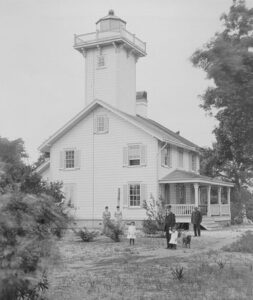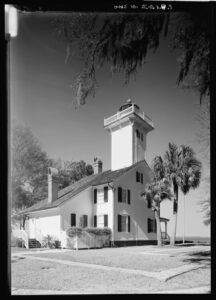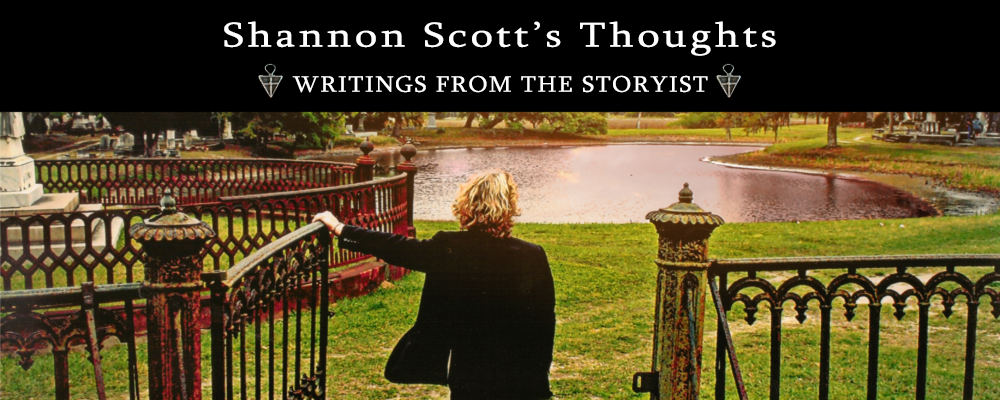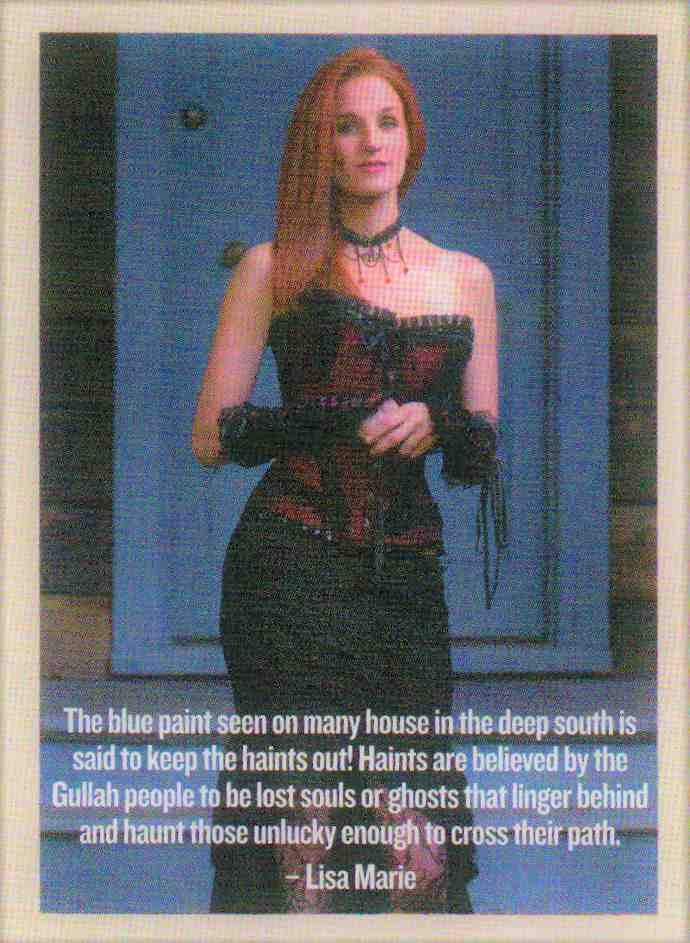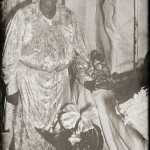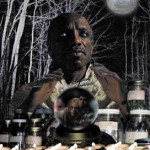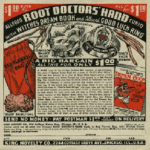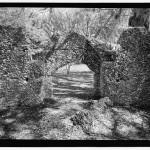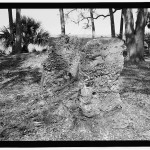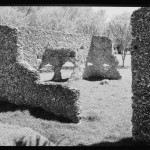NOTE: Years ago I had two tours primed to begin on South Carolina’s mysterious and “cursed” island, Daufuskie. A ghost tour and a history tour. All was in place until a resort had its golf carts repossessed and a boat captain couldn’t keep his business of years afloat from the sheer collapse of things on the island economically. Life is still a struggle there but some say getting better. Jimmy Buffet wrote his “Prince of Tides” poem-song about his fears of development threatening this special place. This is my peek at the island through one of its characters and for a time, a man who was to be partners in the endeavor. Meeting him was the best thing that came out of it all really. If you like Part One, encourage me to write Part Two in the comments section. You never know, I just might.
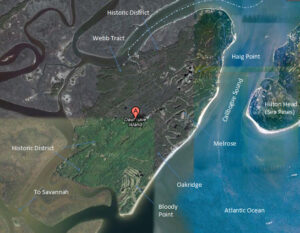
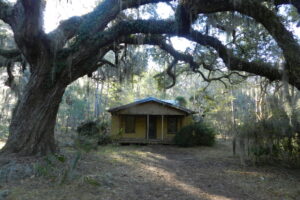
Daufuskie is only lost to those who don’t have a good guide. As is it goes for any in a strange new land who wish to journey it. But that’s the trick if you want to uncover Daufuskie. Unlike some other coastal vestiges with at least the random historical marker or friendly local, on Daufuskie, without the right hired guide, it’s a place that you can explore for hours and literally come away missing her soul beyond the visual obvious. Many like myself, found advance intrigue through Pat Conroy’s autobiographical novel, The Water Is Wide which recounts his time as a teacher to the Gullah children of the island and all of its cultural and political peculiarities. John Voight in one of his earliest film roles took on the role of Conroy in the 1974 film version, “Conrack,” which is how the Gullah children pronounced Conroy’s name. Conroy’s book over time has certainly become Daufuskie’s most sacred, if not controversial text. But beyond Conroy’s tales, most of the info on Daufuskie is scattered in history book footnotes and one or two obscure books. There is great lore in those kinds of passages, but in most respects, that lore is limited to inside the pages of such books. To be on the island itself, it is once more silent on those subjects and gives no real clues to finding any tangible objects pertaining to such stories.
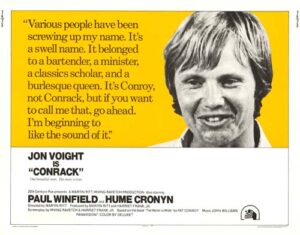
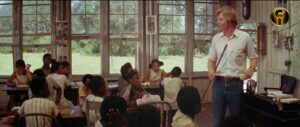
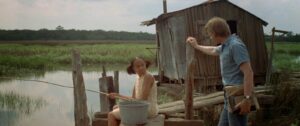
As abstract as Daufuskie remains, a surprising many indirectly know of the island through Jimmy Buffett’s song The Prince of Tides which also became a Conroy novel title and subsequent film. Buffett’s beautiful 1988 poem turned song, is his own lamenting cry to the island and warns of Daufuskie becoming exploited for its beauty by elitist land developers. Today, over 20 years later, the song’s fore-shadowing has been proven all too true. The private neighborhoods and clubs across the island have a feeling of oblivious existence in contrast to the island’s older defining cultures and more integral historical identifiers.
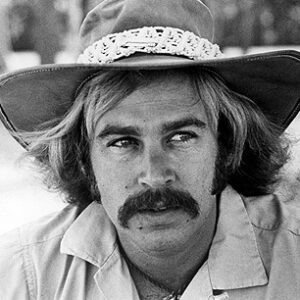
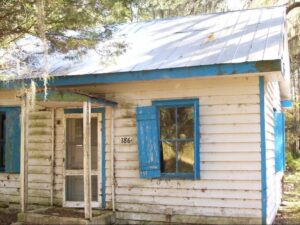
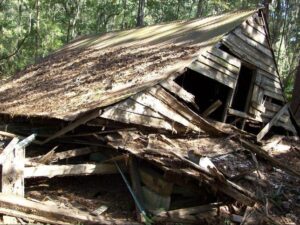
There seems to be an unspoken rule that if you are visiting Hilton Head, “you must go to Daufuskie.” It’s seen as a proverbial “Do Not Pass Go, Do Not Collect $200” type of thing. To the outsider this recreational advisement resembles something unconsciously embedded in minds of coastal residents. Much akin to asking directions to City Hall somewhere, you either get an autonomic like directing nod or a plethora of stories. Some can explain Daufuskie to you and some cannot. Most simply tell you that you must go and most listeners nod back that this must be unfailingly done! On the simplest level to the simplest mindset, it’s a nice boat ride and you can rent 4-wheeler type golf carts and drive around for 6 hours with Bartles & Jaymes wine coolers. Of which as an activity, I have confessedly partaken. I won’t make excuse for that type of fun, but will say that when I did this almost 20 years ago, there was no Plan B for more soulful gain. Alas, to only go Plan Golf Cart will leave you with the sense that you aren’t really very welcome on the island as a whole and by the end you will be abandoned to an empty feeling that you missed out on something that might have been truly great. But yes, most in the end content themselves that the island lunch was good, shrugging that their momentary hollow must be due to the long day and leave no worse for their lack of exploration. But to the Daufuskie pious? This missed chance for island enlightenment cuts a note like news of an unforgivable crime! To the reverent, the island is natural holy ground consecrated by a long history of unique tribes, food, music, artisans, plant & animal life and more. Daufuskie to many is the Low Country equivalent of Mecca! One goes to Daufuskie to commune with all of it’s beauty and inspiration and for those that understand this they might cry, “Put down thy golf clubs and pick up thy divining rods!”
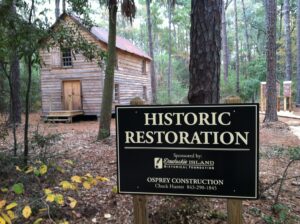
But yes, for those who lack divining rods and don’t already speak Daufuskie’s very spiritual language, one must find themselves the company of a great spirit guide. Permit me then to speak of Daufuskie’s storytelling minister. A man with a calling on Daufuskie known as Low Country Joe. Depending on who you ask, he’s like other mythical, many sided things found on Daufuskie. The meaning is all determined by the degree of light and shadow occurring when you encountered said thing or as in this case, man. Much like the time cured stones from which Joe crafts and wire wraps jewelry, Joe is a composite figure. With Joe, you’re not getting delicate, unobservable crystals. By the time he’s gotten to you, he’s already a complete piece ready for application. Simple to observe and hold, but much the same of other gems, there was a long complex process went into making him. Joe in fact might as well be Daufuskie. By all counts he’s considered the living face and voice of the island, and like the island, Joe has as many faces as he does voices.
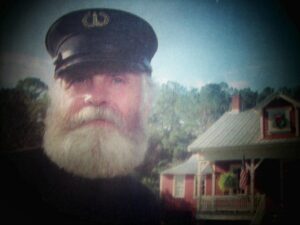
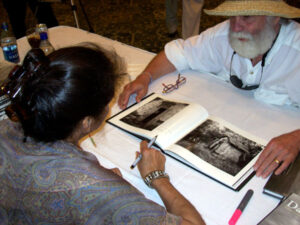

Like all those trying to survive on a complicated land mass like Daufuskie, Joe walks in multiple worlds in order to thrive and to live creatively. When Joe is on Hilton Head Island, he works as a realtor and is greatly admired by his peers for his track record. But for Joe, Hilton Head is the physical world and Daufuskie is the spirit one. One gets the sense that Joe sees going to Hilton Head as the place where he does good earthly work, but that crossing back over the water to Daufuskie is a return to a place more sanctuary like for himself. Yes, Daufuskie is home for Joe, but it’s also a bit of his own personal heaven. Yet for Joe it’s not the Heaven of eternal rest. No, Joe is more than just another celestial resident. He’s more like like an angel on call and his duty it would seem is to explain the place’s surroundings.
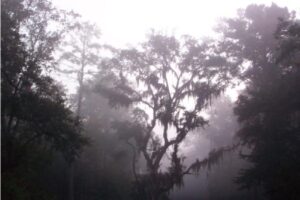
He often tells the tourists that he’s a “tweener.” Meaning that he lives and lavishes in between the two cultures on Daufuskie. There are the fore mentioned rich, living in the Haig Point community, and then there are those who are rich only in culture and family called “Gullah.” They are descendants of the first quarter of a million slaves to enter the colonies, stolen from their native African nation of Angola. Interestingly, if you were to ever visit there, you’d find that those Africans refer to themselves as Golla. When slaves were emancipated, there were many freedmen who trekked Northward to the cities for real work and to begin fresh. In contrast, the Gullah (and the Georgia Geechee), for reasons of home affinity and economics, opted to move themselves to the islands of the Southern coastline. Understandably, this move was basically the perfect situation for those that had mistrust of their former white detractors. The Gullah came to harvest the islands and the sea and traded with the mainland but generally speaking, their culture became an isolationist one. Yet even in those early days of the post war Gullah, there were people who acted as tweeners. People who had need of the Gullah and they had need of them for one reason or the other. Well in the modern sense of Daufuskie, this is the position from which Joe works. Joe cannot be Low Country Joe without the Gullah and whether the Gullah know it or not, they have need of Joe. There aren’t very many people trying to bring positive energy directly to the island in terms of presenting the Gullah’s life and times. But even amongst those who are, Joe is clearly unique.
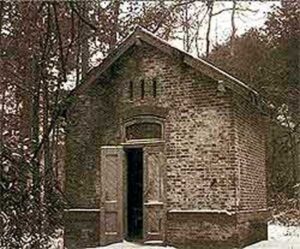
As a member of Haig Point, Joe is certainly not poor, but he is neither extraordinarily rich. It should be noted that when living on Daufuskie, there isn’t much middle of a middle class and of what there is, it’s so far removed from those in the upper crust that they are living more towards the fiscally poor. Low Country Joe’s riches have more to do with quality of life measures. There are other very interesting “tweeners” on the island (some parcel to his tours), but none respectfully seem so much a captain or island dignitary as does Joe. What truly sets him apart is his role as champion storyteller. Of which Daufuskie has more than one bard to count. But Joe through guts, passion and even the occasional act of folly, has landed himself as ringmaster and his guided tours serve as center stage.
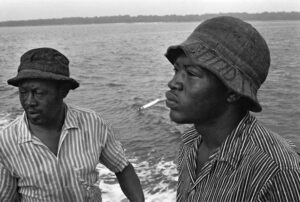
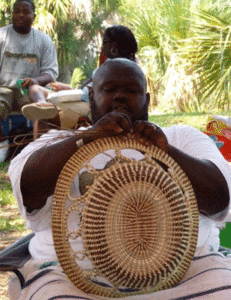
The ferry ride from Hilton Head to Daufuskie is as perfect a 45 minutes that one could ever possibly spend. The unhurried waterways are full of breathtaking scenery of islands, boats, coastal houses, birds, dolphins, clouds, and other sensory delight that only add to the emotional mythos of the journey. In the case of the tour that day, there were a handful of friends with me and Low Country Joe met us earthly side for the ride over to the spiritual sands of Daufuskie. One of the first things you notice about Joe is that he’s very gentle in appearance. His eyes are very soft and he has a very distinguished alabaster white beard and head of hair. He wears a long white, oversized and very finely made safari shirt with lots of pockets and buttons. His wrists and neckline bore wire jewelry that he crafts and with its simple wire, crystals and arrow flint, his whole wardrobe made him feel very much like some holy man escort. There’s a quality to him that is very light and at first, very under spoken. Before we boarded the ferry and were walking through the parking lot, it was almost as if he floated and I had to force myself to catch his sound. This nature I would come to understand is his style as a storyteller. Going from underwhelming to then overwhelming is more his trick you could say. Joe was quietly preparing to run us up a storytelling mountain.
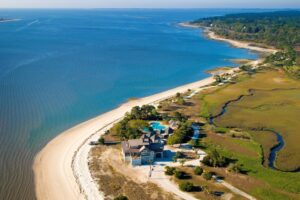

While on the ferry, Joe began to talk to us about “root.” Offering that there was good root operating in the world and bad root. The concept was not unfamiliar to me having lived in Savannah for so long and for having called some Gullah friends and neighbors. I’ve even known a few root doctors in my own time. Root inside the Gullah world and in the most basic sense, is a reference to natural energy in the world that can be used for good and evil. But probably even more primordial than that, it stems from the long history of using roots for the improvement of health, or sometimes to the detriment of an enemy. The belief is that it can be channeled into an object and offered for protection or presented to harm or it can even be instrumented through words. One of the most serious things you could ever say inside of the Gullah culture or even just in some southern neighborhoods would be, “I’m going to root you!” At one time when root doctors were more the medicine people (and a bit like lawyers), of neighborhoods, this kind of a statement was a declaration of war. It would have typically resulted in all parties enlisting their own root doctor to help them do battle.
The phrase and suggestions of root can still be quite affecting. Root isn’t unlike Voodoo or aspects of Macumba or Santeria. Depending on who you ask about the subject, and I might argue that authority in the subject is as subjective as the craft itself, you’re going to get varying claims on it being more good or more evil. Most Gullah are and have been either Christian or Muslim so they tend to stave off the importance or value of root. The mention either gets you scoffs because their churches have taught them its anti-faith or they will simply do their best to avoid getting into its discussion. But make no mistake, root still thrives in this region and those who worship one way or the other in their churches or mosques, still seek out its purpose and practice if they feel it will benefit them in certain situations. If just as a back up measure to prayer and regular legal or medical counsel.
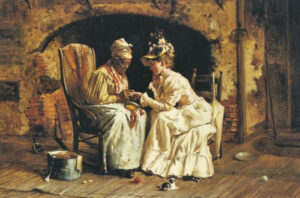
Joe extended his hand to me to show that he held a piece of good root. It was a very old piece of Indian pottery and looked like black obsidian. He handed it to me so that I might consider its energy or powers. I could tell that it was not just old but ancient. It had ridges that reminded me of the way bakers pinch certain pastries at their edges. Its known that Daufuskie was home to what they call the “Woodland” tribes that date about 9000 years ago and Joe estimated that it was somewhere from that time. He’d said he’d found it on “Fuskie” and considered it his personal charm. Which at first I thought it was a gift for me and when he requested it back I made him laugh a little when I called him an Indian artifact giver.
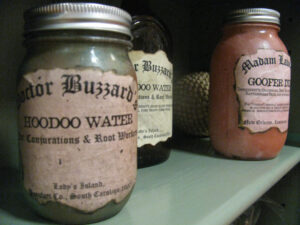
We arrived not far from the historic Haig Point Lighthouse and walked up a winding tabby path towards the Strachan Mansion. Joe marveled to explain that this historic house had been built in the 18th century and in a very fancy move, one of the developers had moved the mansion onto the island flatboat style as a show piece to accent the nearby golf courses and other resort aspects. Somehow the mansion no longer felt antique with its highly manicured surroundings and buzzing golf carts. It looked less historic and more historic “like.” As we stepped into the mansion foyer, or what was once a very grand porch, for all of the many tables and other seating niches, it was devoid of people. Joe began to explain that since one of the resorts went bankrupt that it wasn’t quite what it used to be. I must explain that my interest in Daufuskie is much more about the Gullah and antique for its own sake and my lifestyle isn’t much akin to the life and times of gated communities and resort life. So frankly I was indifferent to the news and for this part of the tour I found myself feeling less convinced about it being that compelling or material. One resort is but another cut of the same cookie in these parts really. Old house out front or not. But besides this, I remained patient because I knew that the “good stuff” was just around the corner.
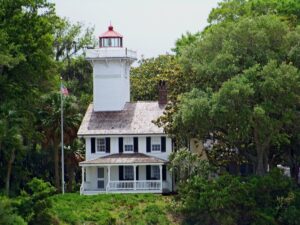
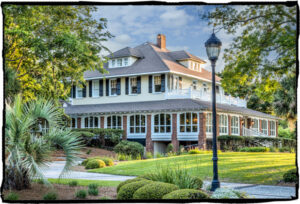
As we went out the back door to what would have been an area for horses, we found instead a stable of golf carts. Some privately owned, some rentals and there were a variety of 57’ Chevy designed ones, those of limo length and off road ATV looking types. On a side note, I would recommend if at all possible, getting one with the fat tires if you’re going to voyage beyond the resort as we did. The sandy, unkempt roads of the historic neighborhoods and other areas aren’t much for the small tread wheels of the one we ended up securing. But I suppose that was a part of the fun too so take it or leave it. Joe made his introductions to the garage staff and we found one that sat all 8 of us and mounted up. What I came to admire about Joe that day was he isn’t one to really color inside of the lines all of the time. He didn’t much bother with golf course, golf cart etiquette and if there was something he felt dire to show us, by God he was going to drive across a yard or some boundary implied border to get us there! Which is also a rank he’s kind of earned but walks finely too. It became clear to me that day by looks and comments of resort members, that he’s revered for his character by some who are worldly and accepting enough, but that he’s also snubbed now as a distasteful entity among the elite. So goes his life as the tweener and for now, he pays his membership dues just like the rest of them.
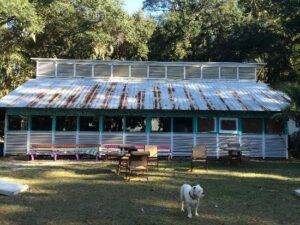

At this point I want to impress that if you have ever wanted to satisfy your childhood or perhaps even adult fantasy of riding shotgun to Willy Wonka inside of his factory, less the immaculate chocolate part of that idea, spending a day with Low Country Joe is a very close equivalent! He is all at once the island mystic and tour guide guru but it comes with personality streaks of a mad hatter alright! He’s going to show you all of the special and secret rooms with much dramatic annunciation, but yes, he’s quick to remind you to have the proper respect of this mechanic or that facet to the island. It would be easy to convince yourself that the island is just his factory with some of his libertine stories and off color takes on the place, but he truly manages to evoke and maintain the appropriate respect for the place while he’s dazzling you. He’s truly a master at balancing this like any great performer. Which I might add is another virtue of Joe’s kind of touring and its importance to the island by contrast to the general offerings of the “get a golf cart and go” routines. As you pass by those “other types” doing that, it’s basically comes off as out of control and bears no resemblance to having any respect for where they actually are.
As we sputtered off across a path or two, our first stop was to a series of tabby ruin buildings. If you’re ever in the South and you want to show off your regional knowledge and even one-up some of the locals, just expound on the subject of tabby ruins and you’ll gain instant respectability. It’s a statement that you’ve put some time in the area and have quite possibly sought them out like an ancient shrine, as many a tabby ruin are only found in obscure places and some even more obscure than Daufuskie. Tabby is a “lost” building art and the substance is comprised of oyster shells, limestone, sand and water. It took 8 men an entire work day to build a section a foot high and 10 ft long. Some of the sturdiest stuff every manufactured in its time and the chemical moment that made all of the ingredients bind is gone from memory. So yes, they’re iconic structures that to the unfamiliar eye look quite primitive and almost like natural formations rather than manmade. According to Joe, these ruins were some of the early slave quarters for the no longer extant Haig Point Plantation of the mid 19th century. But as these ruins sat somewhere between the tee green and the clubhouse, we stayed but a minute and then went ambling back down the road.
A moment or two later we set our sights on the very curious and very beautiful Haig Point Lighthouse built in 1872. It stands so close to the bluff that it very much looks ready to jump into the water! The structure is very much the definition of “light” and “house.” Unlike the rising cylinder or needle styled light houses, it looks like a home that was built around a tower containing a look out deck and housing for the lens. Haig Point Lighthouse was built on top of the foundation for one of the largest tabby homes ever built and when the lighthouse was restored in the 1980s, instead of covering up the foundation, they left the tops of its walls exposed and marks an impressive outline that at first glance appears to be an unusual sidewalk. Joe drove us up close to the house and around it and described that it was now a 2 bedroom B&B situation for guests of Haig Point. Low Country Joe is also known as “Lighthouse Joe” and anything lighthouse is very dear to Joe’s heart since he lives in his own, The Bloody Point Lighthouse on the other end of the island. So if you want to endear yourself to Joe forever, brush up on your lighthouse history and you’ll be fast friends.
